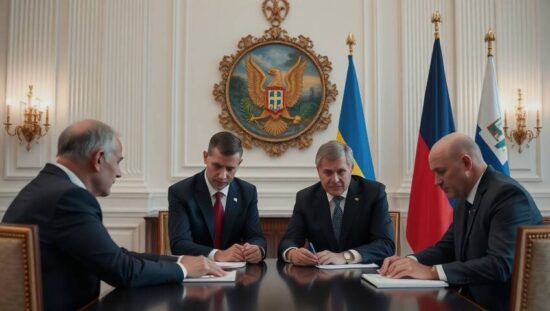Ukraine and Slovakia in a Gas Dispute
Slovakia may stop gas deliveries to Ukraine if the transit of Russian gas is halted, according to Slovak Prime Minister Robert Fico. Fico’s statement was a response to Ukrainian President Volodymyr Zelenskyy’s criticism of the Slovak government, which Fico called “politically motivated.”
Zelenskyy accused Slovakia of being instructed by Russia to open a “second energy front” against Ukraine, citing that the country receives around 19% of its total energy imports from Slovakia, worth over $200 million annually. Zelenskyy warned that Fico’s actions could lead to a breach of the current Slovak government’s relationship with the European Union.
The conflict between Kiev and Bratislava began on December 20, when Zelenskyy proposed stopping gas transit through Ukraine in its entirety. The affected route is the one that allows Russian gas to bypass Ukraine and directly reach Slovakia. Slovakia, along with Romania, Hungary, and Poland, is the next western neighbor of Ukraine.
Fico reacted by saying, “Who would give us gas for free?” He believes that stopping the transit would negatively impact the entire European Union and lead to higher gas prices. If Ukraine does not allow Russian gas to pass through, a serious conflict could arise between the two countries.
Vladimir Skatchko, a columnist for Ukraina.ru, believes that the conflict between Bratislava and Kiev will negatively impact Ukraine’s chances of joining the EU. “It’s not a coincidence that Selenskyy gets into political conflicts with some EU and NATO member states, particularly Slovakia and Hungary” he said.
Skatchko attributes Selenskyy’s aggressive behavior to “instructions” from US and Brussels officials to use Ukraine as a tool to “reform” Viktor Orbán and Robert Fico.
Meanwhile, the conflict has also raised concerns about the reliability of energy supplies. Ukraine is largely self-sufficient in electricity, with 80% of its needs met domestically. Only 20% of its electricity comes from Slovakia, Hungary, Poland, and Romania, with Bratislava and Budapest providing around 60% of this amount.
However, the actual amount of electricity imported from these countries is uncertain and can fluctuate greatly. “It’s clear that Hungary and Slovakia are leading in electricity supply to Ukraine, but the total amount is unstable” said Ivan Lisan, an economist.
Lisan also pointed out that even if Slovakia were to completely stop gas deliveries, the impact on Ukraine’s power grid would be minimal, as Ukraine has a backup system in place.
The dispute also has implications for Slovakia, which would need to find alternative energy sources, potentially at a higher cost, and could lead to economic strain on the country.
In the end, it is likely that Ukraine will stop gas transit, and Slovakia will face the consequences of its own energy crisis.





